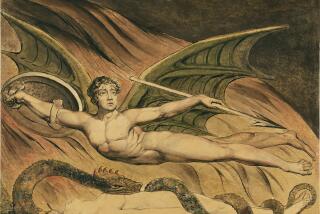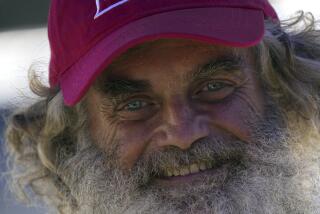America’s Cup Winner Slain by Pirates in Brazil
- Share via
Sir Peter Blake, a storied yachtsman, adventurer and environmental pioneer, was shot and killed as he tried to fend off a gang of hooded pirates who boarded his research vessel at the mouth of the Amazon River, Brazilian authorities said Thursday.
Blake, 53, a native of Auckland, New Zealand, who lived most of the year in England, was “down below” in his 119-foot schooner, Seamaster, waiting to clear customs in the remote Amapa region of Brazil. He was preparing to embark on a two-month expedition, the latest leg of his quest to document the impact of global warming and pollution on the fragile ecology of the Amazon.
About 10:15 p.m. Wednesday local time, as Blake’s crew prepared dinner, notorious marauders known as ratos de agua--Portuguese for river rats--boarded the Seamaster from an inflatable dinghy.
Blake charged onto the deck firing a .30-06 rifle and struck one pirate in the hand. Blake was shot twice in the back seconds later, according to Brazil’s federal police. A bullet pierced his heart, authorities said, and he died almost instantly.
The pirates stole a motor, cameras, lenses and four watches before disappearing into the jungle, cloaked in the dense smoke of nearby encampments. Two members of Blake’s crew were hurt but are expected to recover. Police were working on several leads, a spokesman said.
In the United States, Blake’s fame was largely restricted to such avid sailing communities as San Diego and Chesapeake Bay. But internationally--especially in New Zealand, the self-proclaimed Nation of Sailors--Blake achieved the mythical status afforded the likes of Charles Lindbergh and Sir Edmund Hillary.
Blake was knighted by Queen Elizabeth II in 1995.
The unassuming sailor with a scruffy head of hair and a walrus mustache was a quaint antidote to the riches of U.S. celebrity. Whereas Michael Jordan’s rise to fame launched a frenzied run on expensive Jordan sneakers, the lucky red socks Blake wore during his America’s Cup victories in 1995 and 2000 became the fashion craze Down Under, much to Blake’s amusement.
New Zealand Prime Minister Helen Clark, who visited Blake in Brazil three weeks ago and spent a weekend aboard his schooner, said she was “absolutely devastated” to learn of his death.
“I am appalled that murderers have taken away Sir Peter’s life when he had so much to give through his passion for the waters of the world,” she said. “He was an inspiration to all New Zealanders, and we will all feel a tremendous sense of loss.”
Clark ordered flags atop public buildings flown at half-staff, and emotional eulogies are expected on the floor of Parliament. Blake is survived by his wife, Lady Pippa, and two children, Sarah-Jane and James.
“He’s one of our very few real national heroes,” said Mike Munro, a spokesman for the New Zealand prime minister’s office.
Born in Auckland and reared in the avid yachting community there, Blake began sailing at age 5 and quickly became an accomplished sailor.
He worked his way into Kiwis’ hearts in 1979 by taking a sailing trophy away from Australia. He won the Sydney-to-Hobart race that year and, Munro said, “ever since then it’s been upwards and upwards.”
He won the Whitbread Round the World Race in 1989.
Blake was known as a talented and daring sailor who revolutionized the typically low-key yachting community through his meticulous planning--limiting, for example, the number of personal belongings his crew could take on board to keep down the weight of his boats. He lived comfortably, residing part of the year in an elegant home across the harbor from Auckland, and was skilled at soliciting commercial endorsements for his adventures.
His fame peaked when he won consecutive America’s Cups, the sport’s premier event.
The first victory, in 1995 against the San Diego Yacht Club’s Team Dennis Conner, marked the first time a New Zealand team had won the cup and the second time a U.S. squad had lost in American waters in 145 years.
Last year, Blake--serving more as a figurehead and general manager than a groan-and-sweat sailor--successfully defended the crown off New Zealand against Italy’s Prada team.
Blake recently retired from competitive sailing to start an adventure travel company, and to launch a series of expeditions to study ecological problems throughout the world.
This week Seamaster was anchored off Macapa, the waterfront state capital, where authorities have grappled with ratos de agua in the past.
On the heels of a three-month study of wildlife in Antarctica, Blake had been in Brazil for two months. He was awaiting clearance from customs officials before embarking on another two-month trip, primarily up the Orinoco River in Venezuela, according to a synopsis of the trip provided by a subsidiary of the Swatch Group AG, an expedition sponsor.
Blake was scheduled to shove off in coming days, leaving the mouth of the Amazon to catch the trade winds off the northeast coast of Brazil. He was expected to rendezvous with a team already working on the Rio Negro and the Orinoco.
The trip was intended to monitor the impact of global warming and pollution on the region’s environment, Swatch said.
“Peter Blake was a bit like a cross between Jimmy Carter and Joe DiMaggio,” the U.S. Embassy in Wellington, New Zealand, said Thursday in a statement. “He was loved by New Zealanders as a great sportsman, in the way Americans loved DiMaggio. But he was also recognized for his services to humanity and to the world in a similar way to Carter.”
Many of Blake’s friends and sailing colleagues said that despite his accolades and trophies, he considered his environmental work to be his most important endeavor.
“He had left behind his many major achievements in sport to dedicate himself to creating greater awareness of the need to take better care of the world,” said Alan Sefton, a friend and spokesman for Blake’s expedition company.
“And, typical of the man, he was giving it his heart and soul along with all those other virtues with which he had become synonymous--total passion, charisma, commitment, leadership and integrity.”
In the last entry of his log, filed via satellite, Blake wrote eloquently of the Amazon, describing how dusk “has turned the surface of the river into a greasy gray, with the sky quickly darkening after the sun’s orange and golds have gone.”
The locale was exotic, to say the least--he wrote of flashes of heat lightning and flaming, floating smudge pots that mark the edges of fishing nets that passing ships must avoid. Blake also wrote of danger--but mostly from such river hazards as logs, patches of weeds and fishing boats without lights.
More than anything, he wrote of the pressing need to reveal the Amazon’s ecological disasters to the rest of the world.
“Why are we here?” he wrote this week in his last entry.
“The quality of water and the quality of life in all its infinite forms are critical parts of the overall, ongoing health of this planet of ours, not just here in the Amazon, but everywhere. . . . The hardest part of any big project is to begin. We have begun. We are underway. We have a passion. We want to make a difference.
“Kind regards, Peter.”
*
Times special correspondents Paula Gobbi in Rio de Janeiro and Rich Roberts in Los Angeles contributed to this report.
More to Read
Sign up for Essential California
The most important California stories and recommendations in your inbox every morning.
You may occasionally receive promotional content from the Los Angeles Times.














